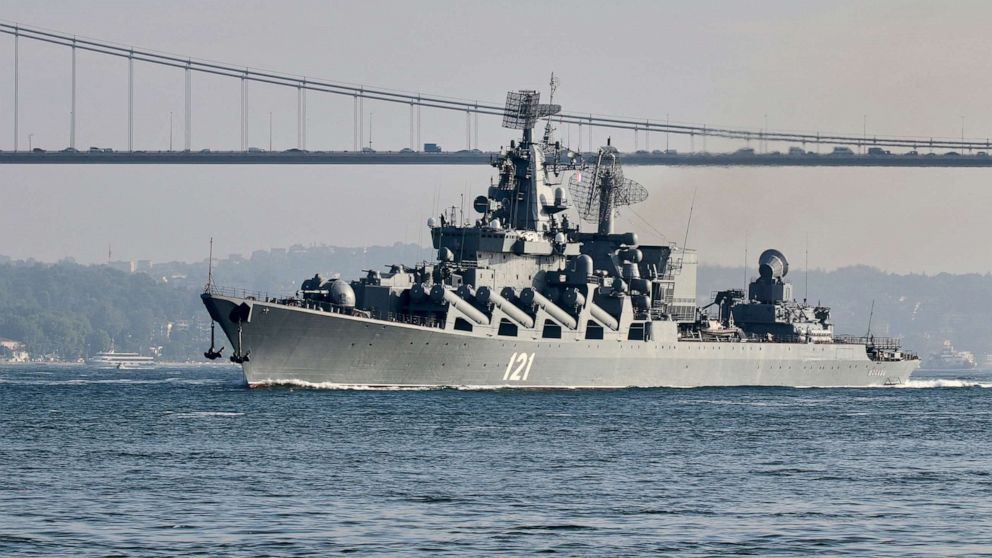Russian warship sinks after Ukraine claims it struck ship with missiles
The Russian Defense Ministry announced on Thursday that its Black Sea Fleet flagship vessel, Moskva, sunk after losing its stability when it was towed to a port. Russia said the ship sustained damages during a fire started by the detonation of ammunition.
Ukrainian government officials, on Wednesday, claimed its armed forces fired missiles that struck the vessel, causing damage.
Ukrainian presidential adviser Oleksiy Arestovych and Anton Gerashchenko, an adviser to Ukraine's Ministry of Internal Affairs, said there was an explosion and that the cruiser is on fire.
The governor of Odessa Maksym Marchenko claimed on Telegram that two anti-ship cruise missiles struck the cruiser in the Black Sea, causing "very serious damage."
Russia earlier said the ship was seriously damaged, but did not confirm that was due to Ukrainian strikes. Russia claimed a fire abroad the ship forced all 510 members of the crew to evacuate.
"As a result of a fire, ammunition has detonated on the Moskva missile cruiser. The ship was seriously damaged. The crew was completely evacuated," the Russian Defense Ministry said in a statement.
"The cause of the fire is under investigation," the statement said.
Russia later said the fire aboard the ship was contained and that the Moskva will be towed to a port. Russia's Defense Ministry said the main missile weapons on board were not damaged, but made no mention of missile strikes in its statement.
A senior U.S. defense official told reporters the U.S. assesses that the crew of the Moskva is still battling a fire aboard the ship.
About a half-dozen other ships that had been close to the Moskva have now moved further away from the coast into the Black Sea, the official also said.
The Pentagon said it can not confirm or deny whether the ship was hit by a missile.
"We cannot confirm the Ukrainian reports that it was hit by a missile but we are also not in a position to refute that it could have been a Ukrainian missile which struck the ship," Pentagon press secretary John Kirby told reporters at a briefing on Thursday.
Noting that the U.S. does not have perfect visibility into the situation, Kirby said, "we do believe that there was a significant explosion on this cruiser the Moskva of a Slava class of cruisers in the Russian Navy. We do believe that that that explosion caused a significant fire, which as of this morning was still raging aboard the ship."
Kirby said "at least some" of the Moskva's crew had evacuated to other Russian Navy ships but he couldn't say it was the entire crew. He added that the U.S. doesn't have "a better, clearer sense of the damage done" and whether the ship could be repaired.
In an interview on MSNBC Thursday, Kirby said there wasn't enough information to determine if the explosion was in fact caused by a Ukrainian missile strike, though it can't be ruled out.
Despite the Russian Defense Ministry claiming the ship was being towed, Kirby said it was under its own power and looked to be headed east toward Sevastopol in Crimea.
"She was operating about 60 miles or so south of Odessa and we know she suffered an explosion," Kirby said on MSNBC. "It looks like from the images that we've been able to look at it looks like there's a pretty sizable explosion too."
Kirby later told reporters the U.S.'s assessment is now more uncertain that was now the case.
“While we had assessed that the ship was underway under its own power, we are no longer able to make that certainty today, this afternoon,” he said. “We're not exactly sure that the ship is actually still able to make its own way.
Kirby told reporters that so far Russia’s Navy has been limited to launching cruise missile strikes inside Ukraine and resupply efforts.
“It remains to be seen exactly what the major impact is going to be,” said Kirby.
On CNN, Kirby said the U.S. is unaware what caused at least one explosion abroad the ship, describing the explosion as "a fairly major one at that, that has caused extensive damage to the ship."
-ABC News' Fidel Pavlenko, Luis Martinez, Oleksiy Pshemyskyi and Yulia Drozd contributed to this report




